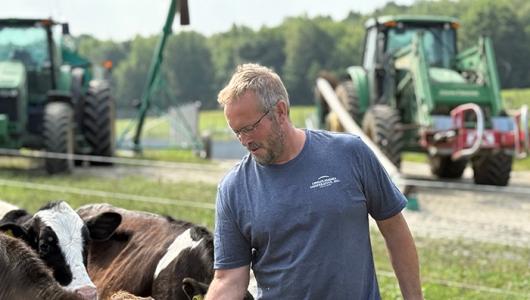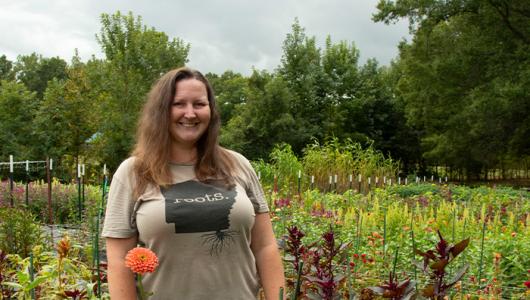Shimin Liu has an interesting future retirement plan. He wants to establish an organic, diverse, mixed vegetable and livestock farm and homestead, called the River of Life Eco Farm on his 88 acres of land in Middleboro, Massachusetts. He also wants to provide the local community with healthy, sustainably grown produce and livestock.
With help from USDA’s Natural Resources Conservation Service (NRCS) and funding provided by the Inflation Reduction Act, Shimin is beginning his journey toward that goal by first taking care of the forest on his land. The Inflation Reduction Act provides an additional $19.5 billion for NRCS to deliver financial and technical assistance to producers through existing USDA conservation programs.
“I researched resources for new farmers and came across NRCS online,” Shimin said.
Shimin primarily needed assistance with forest management strategies to improve wildlife habitat while maintaining forest productivity and health. Mathew Robert Miller, NRCS Soil Conservationist in Massachusetts, created a conservation plan for Shimin specifically using the practice Forest Stand Improvement (666), which was eligible for funds provided by the Inflation Reduction Act.
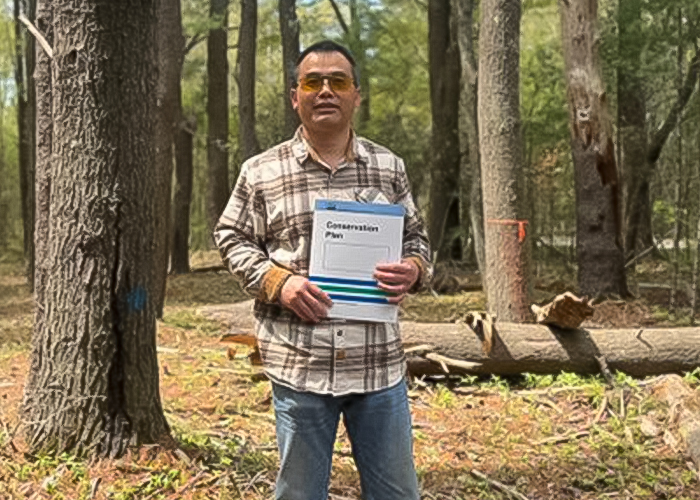
Implementing forest stand improvement in different regions can facilitate forest regeneration and growth to enhance forest carbon stores, while also increasing the land’s resilience to disturbances, including reducing risks of catastrophic wildfire and associated emissions. Debris from forest thinning are mulched and left on the forest surface to provide wildlife habitat and continue to store carbon for years, eventually decomposing, cycling nutrients, and setting the stage for new tree growth.
“NRCS funding did not cover 100 percent of the [cost of] forest thinning,” said Shimin, “but it helped make it possible to implement [the practice] and on a faster timeline.”
Shimin grew up in rural China, just south of Bejing in Shandong Province, during a time of food shortages and government-controlled farmland. There, he lived on a piece of land where his parents established a subsistence garden to ensure they had access to healthy produce. They grew corn, sorghum, sweet potatoes, and wheat for flour. He wants to be able to provide his children with the same experience he had growing up, cultivating high quality products from his farm. Shimin, his wife and two children live in the greater Boston area and plan to eventually live full time on the property in Middleboro, a rural area in Plymouth County.
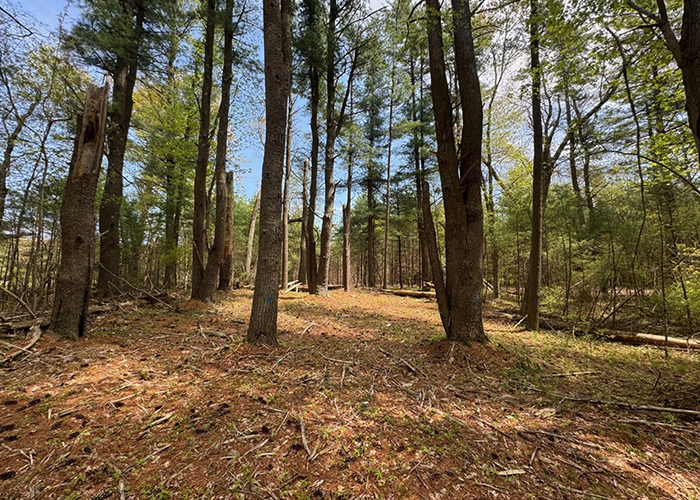
Shimin contracted with a company to implement the conservation plan. The subsequent forest thinning created economic opportunities and other co-benefits for Shimin, his land and the surrounding community. Shimin was able to sell his wood, and he used the wood chips and sawdust for growing gourmet mushrooms – all generating revenue. When select trees were harvested, smaller trees were able to grow beneath – increasing carbon sequestration. In addition, the underground stumps were left untouched and allowed to rot naturally, converting to organic carbon in the soil. This type of project also has the potential to reduce risk of wildfire or other disturbances and increases local product availability while conserving the land and improving ecosystem health.
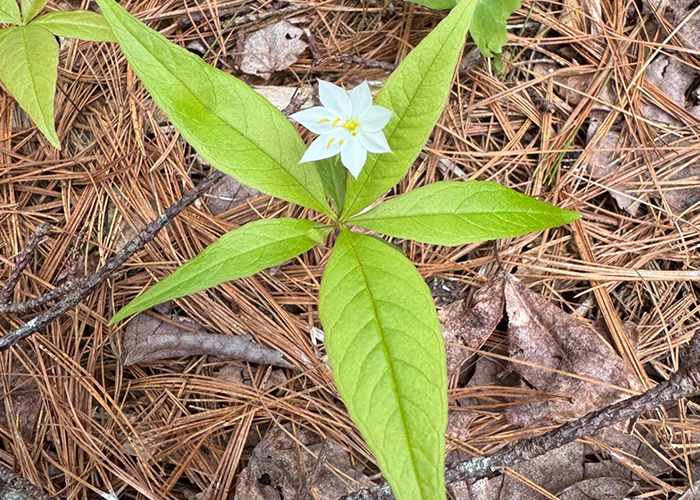
Shimin has already noticed some positive effects from the project. Due to the decrease in canopy cover, there is more sunlight getting to the forest floor, and forage grasses are beginning to grow in the understory. Native species are growing that were not previously present, including clover, rye, sheep sorel, Cinnamon fern, wood fern, field horsetail, Canadian mayflower, starflower, black cherry, black maple, and golden rods. Woody debris left behind are beginning to decompose, adding organic matter into the soil, and are increasing wildlife habitat and presence on the property.
He believes that anyone involved in agriculture should reach out to NRCS, a valuable resource especially for new farmers and landowners.
“Being a beginning farmer, resources are in high demand, and assistance in any form, financial or technical, will improve your operation,” said Shimin. “I’m grateful for the financial and technical assistance NRCS has provided.”
Shimin is excited to begin managing his dream farm and the next chapter of his life.
Zoraia de Jesus Barros is a public affairs specialist and Mathew Robert Miller is a soil conservationist for NRCS in Massachusetts.

